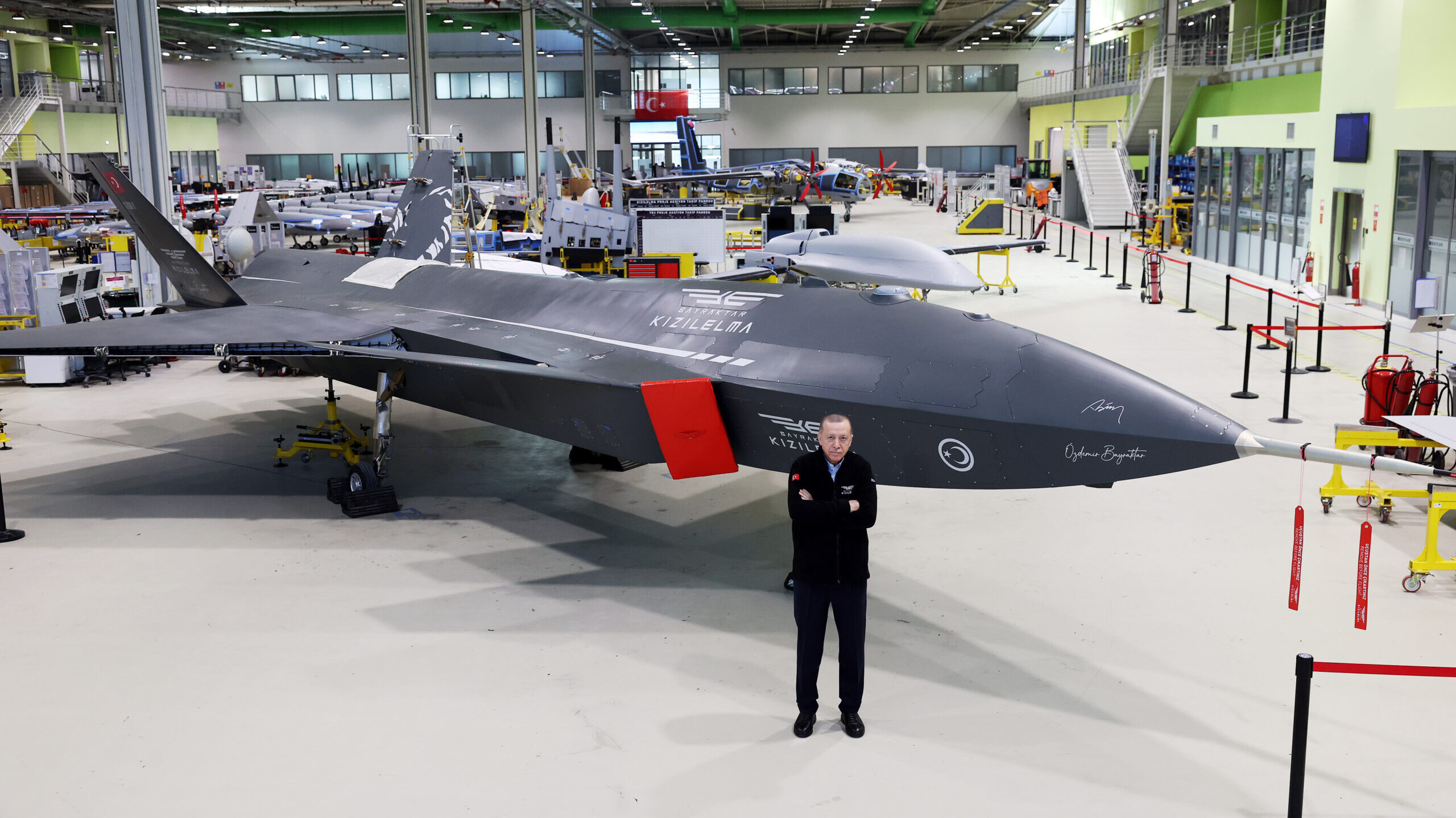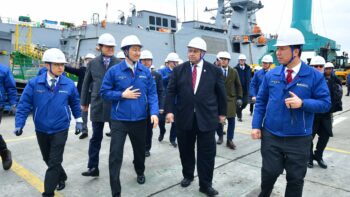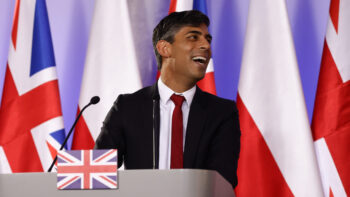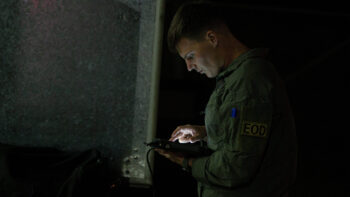
Turkish President Recep Tayyip Erdogan poses in front of “Kizilelma”, an unmanned fighter jet, at a Baykar factory in Istanbul on 26 March 2023. TB-3, an armed drone with short-range landing and take-off capabilities in folding wings is visible behind. (Twitter)
ANKARA — Turkish President Recep Tayyip Erdogan officially cut the ribbon for Turkish navy’s flagship TCG Anadolu today, delivering the nation’s largest ship that can carry helicopters and armed drones.
To be clear, Anadolu is an important step for the Turkish military. An amphibious assault ship that will be able to transfer at least a battalion-sized force and carry eight boats, it will also host aircraft such as Baykar’s TB-3 armed drone, which will have folding wings.
But it is no coincidence that Erdogan is launching this ship, which was under construction for five years, less than 34 days before the May 14 general election. Recent polls indicate that it will be a tight race and every vote counts. And analysts say shiny new toys presented by Erdogan to the public may play a role garnering more votes for the incumbent, who is facing an uphill battle due to an economic crisis and public fatigue after 20 years in power.
Six opposition parties, led by the center-left Republican People’s Party (CHP) have nominated Kemal Kilicdaroglu as the joint contender against Erdogan after months long negotiations. But the opposition is struggling to maintain unity, with Muharrem Ince, a former Kilicdaroglu colleague, running under his own ticket. Various polls indicated that Ince could get 5 to 10 percent of the votes from the segments of the society that dislike both Kilicdaroglu and Erdogan, splitting the opposition. Ince’s popularity could trigger a runoff since neither Kilicdaroglu nor Erdogan would be able to get the required 50 percent to win the race.
RELATED: As Egypt and Turkey mend ties, could defense deals follow?
A poll conducted by Yon Eylem Research from March 27 to 29, with 2,655 respondents, indicated the presidential race will likely go to a runoff. The survey says Kilicdaroglu might get 46.4 percent of the vote while Erdogan might stay around 41.6 percent, and Ince will receive 9.1 percent.
Hence, every vote might count, and every lever of power is being pulled. A senior ruling Justice and Development Party (AKP) official told Breaking Defense that the defense industry products were part of the electoral strategy, with the goal of presenting Erdogan’s track record as a leader who can deliver concrete results. “We are offering things we have already achieved, while the opposition is still trying to unify,” the official, granted anonymity to speak freely, told Breaking Defense. “We will continue to unroll more of them as the industry targets 2023 as the year we celebrate the centennial of our republic. This is why a lot of products made progress.”
Over the last month, Erdogan’s government has publicly pushed progress on a number of projects that once seemed impossible. Ankara’s fifth-generation TFX fighter successfully completed its first taxi test, as did the light combat and training aircraft Hurjet. Turkish Aerospace Industries (TAI), a government owned company, revealed the first picture of Anka-3, a drone with stealth capabilities.
Baykar, the Turkish defense company that has become famous for its drones used against the Russian military in Ukraine, announced completion of medium-altitude flying tests for its Kizilema unmanned fighter jet design. The company — run by Erdogan’s son-in-law Selcuk Bayraktar — was happy to have Erdogan pose in front of the aircraft last month. Baykar will also hold another TeknoFest later this month, an event where Turkish defense industry products are showcased to the public, including the TB-3.
Erdogan will also officially receive the first Turkish national battle tank called Altay on April 23, on the national sovereignty day, a holiday in Turkey that celebrates the opening of the grand assembly, also 21 days to the elections. The BMC, the company that produces the tanks, aims to mass produce them beginning in 2025.
“Turkey’s homegrown defense industry is certainly a key part of the overall package President Erdogan is offering to voters — the idea of a rising Turkey that will play hardball in an age of great power competition,” Aslı Aydıntaşbaş, a visiting fellow in the Center on the United States and Europe at Brookings, told Breaking Defense. “With his assertive diplomatic style and support for self-reliance in the defense industry, he is promising to ‘Make Turkey Great Again.’“
Under Erdogan’s watch, the defense industry has cut its reliance on the foreign suppliers. Ismail Demir, the president of Turkey’s defense procurement agency, claims the Turkish defense industry can supply 80 percent of its production needs domestically. He said that Turkish defense exports reached $4 billion last year as ongoing defense projects are valued at around $75 billion.
Mehmet Ali Kulat, the general manager of polling company MAK Consultancy, says the Erdogan government, through careful messaging and the use of media, has manufactured an appeal among voters towards a vision where Turkey is a regional powerhouse with a strong defense industry. “The weapons and aircraft Erdogan releases days before an election of course has an impact thanks to this perception that Turkey is constantly under attack,” Kulat told Breaking Defense.
The government doesn’t even need to push it too hard since the Syrian war, Ukraine crisis and millions of refugees in Turkey have already made voters think about their future as a society, Kulat noted.
While this strategy could capture 1 to 2 percent of undecided voters, its impact is mainly on retaining the nationalist and religious voters who are already supporting Erdogan, Kulat added. That’s something Aydintasbas agrees on — that Erdogen’s hopes rely on keeping his base fired up.
“The propaganda value has maxed out. For younger people, who live in double-digit inflation, have no job prospects, and cannot live the lifestyle that kids their age have in the West, this is starting to sound hollow,” Aydintasbas said. “For many, the situation is we have great weapons but I have no prospects of getting a Schengen visa to travel in Europe. They know how other kids their age live in the West thanks in part to social media.”
Lockheed Martin projects potential $1 billion loss on classified program
Lockheed CFO Jay Malave said the company currently expects the program to become profitable on an annual basis around the 2028 timeframe.


























